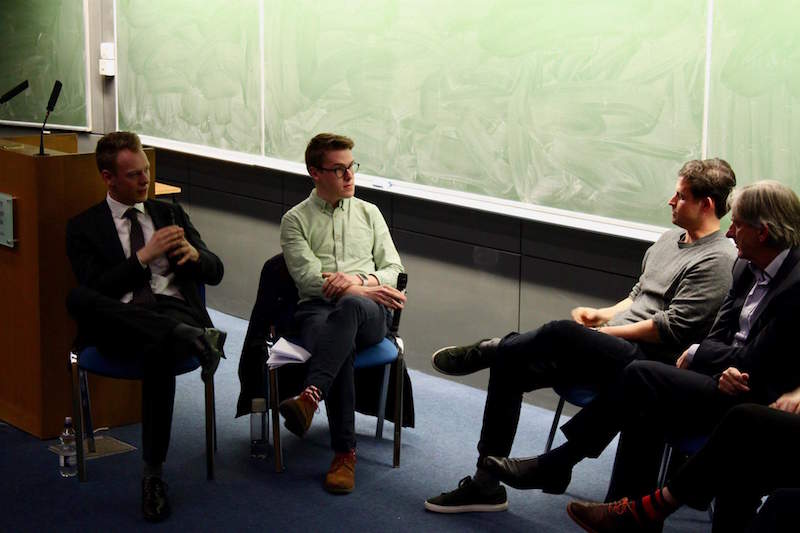
Last night, the MacNeil Theatre was unusually full of silver-haired, sharply-dressed business magnates, as the Trinity Entrepreneurial Society (TES) hosted its first Taste of Success event, presenting “The Future of the Food Industry” in collaboration with the DU Food and Drink Society.
The event included four entrepreneurs from Dublin’s food and drink scene: Jack Kirwan, founder of Sprout & Co; Brody Sweeney, founder of O’Briens sandwich bars and Camile; Ross Lewis, co-founder and head chef of Chapter One; and Dave Phelan, creator of Baileys, Coole Swan and current Head of Retail for Jose Cuervo Tequila.
Each panellist came with their own accolades: Ross Lewis, for instance, has had a Michelin star since 2007. Kirwan, the youngest panelist by a long shot, took the opportunity to promote Sprout’s upcoming new location on Baggot St, which will be the brand’s biggest space yet and expand its number of restaurants to five.
The story of how each business began was unique, ranging from stories of financial bust, creating a business from J1 inspiration, to simply going with the flow and where work takes you. A standout point of the discussion was that none of the successful businessmen on stage ended up doing what they expected. The panel were also asked to discuss what differentiated their business from others.
For Lewis, the location of Chapter One on Parnell St forced him out of his comfort zone and to offer something worth coming for. For Phelan, when developing Coole Swan Irish cream, the design of the bottle played a crucial role in differentiating the brand. The frosted, cream bottle stood out on the shelf next to Baileys. It was looking at what his competitors were doing, and learning from their mistakes.
Brody Sweeney gave a slightly more honest, if somewhat off-putting, account of the origin of Camile. The name itself came about as a result of an online survey. “It wasn’t my choice”, Sweeney said.
“We sat as middle-aged men do, imaging who Camile could be, what was she like”, he told the audience. Together, Sweeney and the other co-founders agreed that she was a 25-year-old, European-Asian girl who lived in Bangkok in the 1930s. “She’s tall and beautiful and she wore amazing clothes and she’s good craic and she likes her food”, he said. Not exactly what I’d envisaged on previous trips to Camile.
It was put to the panel by the chairs of the event, Paul Allan, the President of TES, and Alexander Fitzpatrick, President of DU Food and Drink, that there was a lack of female representation among them and whether this was reflective of the Dublin food and drink industry as a whole.
While it may just have been a simple coincidence, it was quite an obvious absence. “Females make better chefs”, Lewis claimed, in comparison to their lumbering male counterparts. Equally Kirwan pointed out that 65 percent of Sprout employees are female. Despite this, it was generally acknowledged that there was indeed an under-representation of females in the food and drink industry, though there has been notable progress over the past few years.
The main reasons cited were the long-standing and notorious lack of respect in the kitchen – which has been improving over time – and the unsociable hours that don’t allow for much flexibility in terms of family life.
Some final points centred on new innovations in the food and drink industry, and the panelists’ opinions on the rise of obesity, particularly over the coming decades. The general consensus seemed to be that the rising trend towards organic, “healthier” and vegan food, was the result of better education. On an optimistic note, Lewis hoped that the thirst for more education would lead to better food choices, and a subsequent decline in obesity levels.
Sweeney was more cynical, and cited the rise of technology and introduction of multiple screens into our lives as making us lazier than ever. He noted that Camile was directly benefiting from this increased laziness, and that online deliveries have become a major aspect of its business model. The chain hopes to open a store approximately every two miles: more appropriate spacing for home delivery.
When questioned about the rise of “lab-grown meat”, each panel member seemed certain that there was a general shift in trend towards local and organic produce, despite hefty Irish regulations, and that this sort of meat, while potentially better for the environment, didn’t pose much of a threat to the Irish food and drink market.
Closing remarks were made about the over-regulation of health and safety in the industry. Each entrepreneur felt that Ireland looked at its interpretation of EU directives too stringently, which resulted in higher costs and difficulties in getting a foothold in the market. Perhaps appropriately, the event ended with food.
Correction: November 30th, 2017
An earlier version of this article incorrectly spelled the name of the founder of Sprout & Co, Jake Kirwan.






